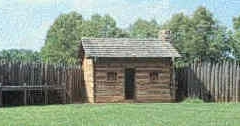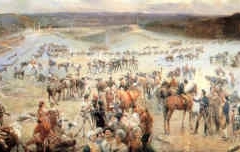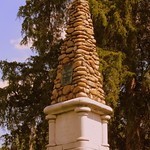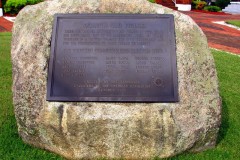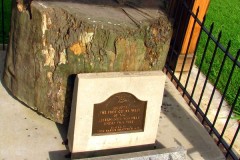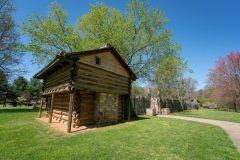Sycamore Shoals
Sycamore Shoals was the location of three important events that shaped the history of this region.
In 1772, that the first majority-rule system of American democracy, The Watauga Association, was established. The Articles of the Watauga Association established an independent government, based on democracy as we know it today, four years before the American Declaration of Independence was written by Thomas Jefferson. Many signers of the Articles petitioned the state of North Carolina to be part of that state’s government.
From the Downtown Elizabethton Walking Tour brochure:
The first republic established west of the Appalachians was the Watauga Association, which was formed in May 1772 under the shade of an old Sycamore tree, located on the banks of the Doe River.
Very little is known about the first court except that five magistrates and 13 commissioners were chosen to lead the government that existed until 1776. Tradition holds that Andrew Jackson may have also held court under the tree or in a house nearby.
The famed tree, cut down in 1987 (after many efforts to save it), was located across the street from this memorial where a concrete pedestal marks the hallowed spot where the court arising from the first written compact made by a free and independent American people was held.
The Sycamore Shoals Monument is a three sided shaft of river rocks and was built in the 1930s and placed up a small incline near the entrance to Elizabethton. The monument is not on the historic site; it is on the old road to Johnson City, G St. or TN Highway 67 – it runs parallel to the newer and more travelled US321. [Source: image photographer]
On March 17, 1775, the Transylvania Company, led by Richard Henderson, was involved in the largest private real estate transaction in United States’ history. For the price of 2,000 pounds sterling and 8,000 pounds in goods, the company purchased 20 million acres of land from the Cherokee. The territory included the Cumberland River watershed and lands on the Kentucky River.
During these dealings, local settlers “purchased” the right to remain on the Cherokee land they were living on in the Watauga settlement. One of the minor chiefs, Dragging Canoe, opposed to the selling of the Cherokee ancestral hunting grounds, warned the settlers they were purchasing a “dark and bloody ground”. He and his band of disaffected warriors waged war against the settlers for the next twenty years.
Fort Watauga was built here and used as a base to defend the frontier against the Indians and the British.
In late September, 1780, the Overmountain Men mustered here for their march to Kings Mountain, SC, to give battle to Colonel Ferguson, who had threatened to march over the mountains and lay waste to their land with “fire and sword.” This battle was a turning point in the Revolutionary War.


